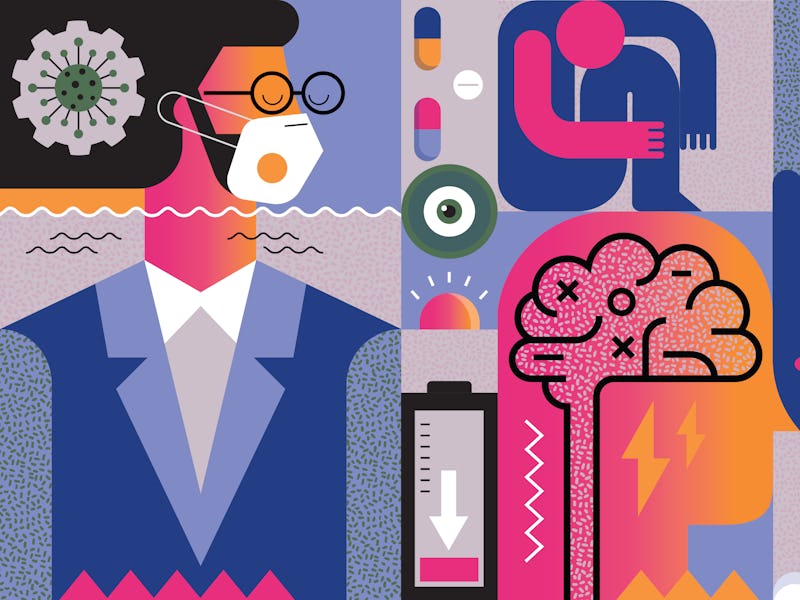Scientists reveal a fascinating link between the immune system and anxiety
The immune system affects the mind and body.

It’s tempting to separate the novel coronavirus pandemic into two categories of concern: a crisis of health and a crisis of mental health.
We know, for example, that a difference in immune response could explain why men, as well as older patients in general, are more likely to die from the disease. We also know that the pandemic is taking a toll emotionally, driving symptoms of anxiety and depression.
Research published this week, however, is another reminder that it’s time to consider these crises holistically. A new understanding of a molecular link emphasizes that mental health is health, and the immune system is intimately connected to emotions.
Scientists report in the journal Nature Immunology that an immune molecule called IL-17 may be a key link between the immune system and its effect on the mind and body. Experiments demonstrated that interactions between this molecule and neurons in the brain can influence anxiety-like behaviors in mice.
Next, the team wants to explore how this molecule affects human anxiety. First author Kalil Alves de Lima, a research associate at Washington University, tells me that given what they know so far, the current hypothesis is that “the overstimulation of this pathway could be ultimately involved with anxiety and depression in humans.”
IL-17 is categorized as a cytokine, a signaling molecule that orchestrates the immune response to infection. At this point, you’ve likely heard of cytokine storms, an outsized reaction of the immune system linked to mortality in Covid-19 patients. Some early studies have correlated high levels of IL-17 with anxiety and depression in people.
The green in this image signifies neurons in a mouse brain. These neurons detect IL-17.
Alves de Lima and his colleagues realized the immune cells in brain tissue included a small population known as gamma delta T cells (gdTcells) — these produce IL-17. Senior author Jonathan Kipnis, a professor of neurology at Washington University and the director of the Center for Brain Immunology and Glia, tells me that while his lab has studied how meningeal immune cells and molecules affect the brain for some time, after they “stumbled” on gdTcells, they “decided to explore them in-depth.”
Typically, the meninges — the layers of membrane that protect the brain and spinal cord — are filled with gdTcells, and these continually produce IL-17. In an effort to see how these components affect behavior, the team modified mice to either lack gdTcells or IL-17 and then put them through a battery of tests designed to evaluate memory, social behavior, foraging, and anxiety.
Ultimately, they found the mice that lacked those components were the same as the mice with normal conditions, save for one area: anxiety. For example, when the mice were given the option of entering an exposed area, the “normal” mice stuck to the protective sides of their enclosures, while the modified mice entered into open areas.
"Our behavior is very much dependent not only on the state of the brain but also on the state of the immune system."
Alves de Lima says this suggests gdTcells, and the IL-17 they produce, are “constantly sensing environmental signals,” helping to keep their host in a default, pro-survival state and discouraging behaviors that increase the chances of dying, infection, or predation.
Other experiments, like removing the neurons in the brain that have receptors that respond to IL-17 and injecting the mice with a bacterial product that elicits a strong immune response, also suggested that the molecule helps regulate behavior as part of a system of neuro-immune communication.
Ultimately, these results suggest the immune system and the brain co-evolved, and that the brain and the body are more connected than most people realize.
“Our behavior is very much dependent not only on the state of the brain but also on the state of the immune system,” Kipnis says. “We all know how we feel when we are sick. This is a normal interaction between the two systems when the immune system signals the brain to ‘withdraw’ upon infection.”
After encountering a particular stimulus, there are many “signals” the immune system can send to the brain to alter its function, and in turn, our behavior, Kipnis explains. The two systems are dependent on each other.
Now the team is investigating how all this plays out in people, and how these elements interact and are affected by stressful events and detrimental behavioral changes.
“The final goal is always to validate and translate our observations to a therapeutic angle,” says Alves de Lima, “and we are now starting collaborations to have access to human samples.”